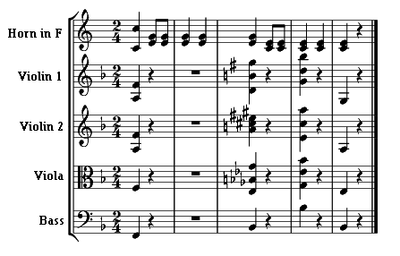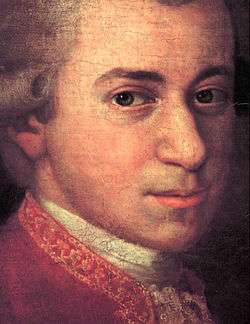A Musical Joke
A Musical Joke (in German: Ein musikalischer Spaß) K. 522, (Divertimento for two horns and string quartet) is a composition by Wolfgang Amadeus Mozart; the composer entered it in his Verzeichnis aller meiner Werke (Catalogue of All My Works) on June 14, 1787. Commentators have opined that the piece's purpose is satirical – that "[its] harmonic and rhythmic gaffes serve to parody the work of incompetent composers"[1] – though Mozart himself is not known to have revealed his actual intentions.
Structure and compositorial elements

The piece comprises four movements, using forms shared with many classical divertimenti:
- Allegro (sonata form), F major
- Menuetto and trio, F major (trio in B-flat major)
- Adagio cantabile, C major
- Presto (sonata rondo form), F major
Compositorial comedic devices include:
- secondary dominants replacing necessary subdominant chords;
- discords in the horns;
- whole tone scales in the violin's high register;
- clumsy orchestration, backing a thin melodic line with a heavy, monotonous accompaniment in the last movement;
- going to the wrong keys for a sonata-form structure (the first movement, for example, never succeeds in modulating to the dominant, and simply jumps there instead after a few failed attempts);
- starting the slow movement in the wrong key (G major instead of C major);
- a pathetic attempt at a fugato, also in the last movement.
The piece is notable for one of the earliest known uses of polytonality (though not the earliest, being predated by Heinrich Ignaz Franz Biber's Battalia), creating the gesture of complete collapse at the finale. This may be intended to produce the impression of grossly out-of-tune string playing, since the horns alone conclude in the tonic key. The lower strings behave as if the tonic has become B-flat, while the violins and violas switch to G major, A major and E-flat major, respectively.
Whole-tone scales and polytonality are foreign to music of the classical era. However, these became common for early 20th-century composers like Claude Debussy and Igor Stravinsky, who were searching for a new musical language. In this later context, these were legitimate new techniques in serious music. In Mozart's time, however, these non-classical elements gave the piece its comedy, expressing the composer's humor.
Translation
The title A Musical Joke might be a poor rendering of the German original: Spaß does not necessarily connote the jocular, for which the word Scherz would more likely be used. In Fritz Spiegl's view, a more accurate translation would be Some Musical Fun.[2]
Other uses
A version by Waldo de los Ríos of the opening of the finale was used for many years as the theme tune to the BBC's Horse of the Year Show.
References
- ↑ Sadie, Stanley (1980). "Wolfgang Amadeus Mozart". The New Grove Dictionary of Music and Musicians. London.
- ↑ [Untitled talk] (Radio broadcast). BBC Radio 3. October 1981.
External links
- Ein musikalischer Spaß: Score and critical report (German) in the Neue Mozart-Ausgabe
- A Musical Joke at the Mutopia Project
- Recording of A Musical Joke
- Ein musikalischer Spaß: Scores at the International Music Score Library Project
